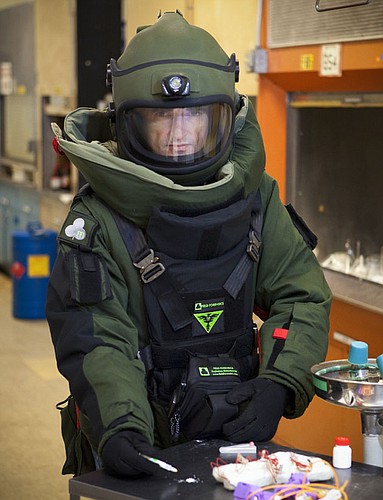- November 26, 2024
-
-
Loading

Loading

In 2001, Craig Johnson launched his company, Field Forensics Inc., out of his garage with the help of $250,000 he received from angel investors. Now anchored at a 6,500 square-foot lab in Largo, Johnson forecasts the firm to hit $50 million in annual revenues by 2015.
It's a big leap for the company that uses licensed technology and patented chemistry to create test kits for explosive and drug detection. Field Forensics currently employs 11 and will record more than $5 million in revenues this year, Johnson says. But he is confident that the firm's innovative field test kits and technology developments will propel the company to his vision of fast growth.
For seven years, Johnson bounced between different labs while building Field Forensics. He spent nights working at Clearwater-based COLTS Laboratories. Then his firm relocated to space in Safety Harbor's Fractal Systems lab, where he wasn't confined to working after hours.
In 2007, The Tampa Bay Innovation Center, then known as STAR TECH, saw promise in Johnson's young company and offered it lab and office space, as well as business coaching. “We seemed to be in their sweet spot,” Johnson says of the organization.
Johnson credits the simplicity of his firm's field tests for the company's growth during the past five years — it doubled revenues every year since 2005 and forecasts double-digit growth for 2011.
For example, Field Forensics' test kits are self-contained and don't require the user to handle several bottles of liquid for a single test, making them faster and easier to use.
This simplicity aids soldiers testing for bomb-making chemicals in the midst of a firefight, particularly Afghan soldiers or police officers. “About 75% of our end users don't speak English,” Johnson says.
Field Forensics' ability to anticipate changes in legislation or preferences of military and law enforcement officials is another key to its growth. When Afghanistan's President Hamid Karzai banned ammonium nitrate, a chemical compound that can be use to make improvised explosive devices, Field Forensics foresaw the need and had test kits ready for Afghan police and border patrol.
Now, Field Forensics is taking on opium refinement, which has become a problem in Afghanistan, Johnson says. Traditionally, the Opium poppy, the main ingredient in heroin, was smuggled out of the country to refineries. Johnson explains that once producers of the drug discovered it was cheaper to manufacture heroin within Afghanistan, these refineries became more prominent in the country.
This year, Field Forensics introduced a new product called the IDEX 800 to detect a key chemical used in heroin production: acetic anhydride. An exclusive contract with the Afghan police force for using these test kits guarantees a steady source of revenue for the firm.
Not all of Field Forensics products end up on the battlefield, however. Nuclear power plants in Canada were some of the first major clients of Field Forensics, Johnson explains. They use the firm's “aroma sensing” technology to detect gasses used in explosives in vehicles entering their facilities. Aroma sensing tests the air for traces of specific chemicals. “It's kind of like a smoke detector,” he says.
Major cruise lines then began using Field Forensics' aroma sensing technology to test the air in shipping containers. Johnson would like to see his technology in every shipping container in the world.
Johnson cites the recent case involving explosive-stuffed ink cartridges sent from Yemen that could have been detected sooner with his firm's technology. One of the devices was disarmed only 17 minutes before detonation.
In Johnson's view, the chemistry and technology his firm develops has potential for large revenues. He plans to start marketing test kits to police officers for use with street drugs. Field Forensics is also working on a new device that can detect explosive materials in any type of contained liquid. It has already presented the technology to the Transportation Security Administration.
Though the firm is still small, Johnson is confident of its growth potential. Says Johnson: “We're definitely gaining ground.”